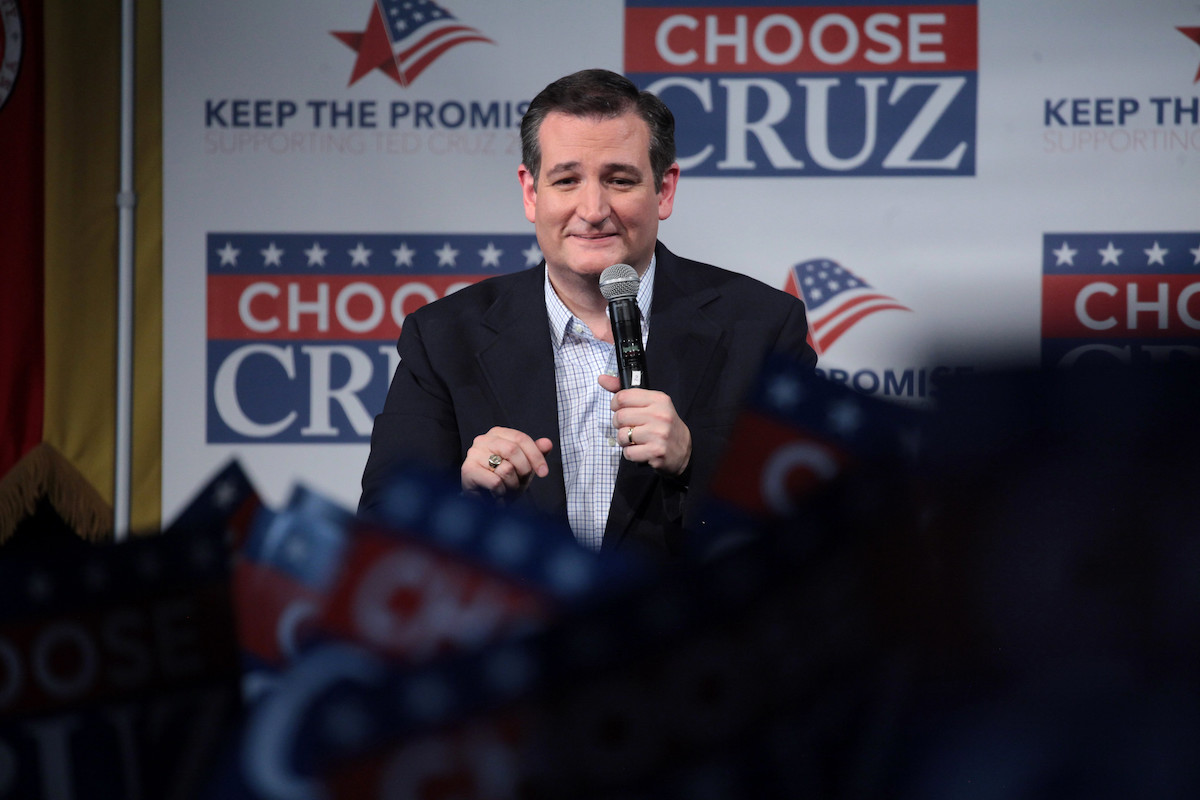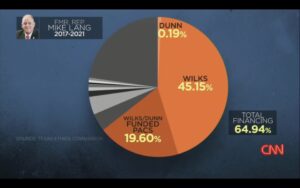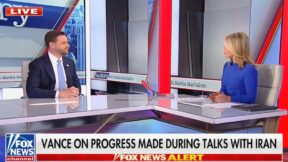Two Texas Billionaires Pushing State to the Far Right Contributed About Two-Thirds of the Funding for Ted Cruz’s 2016 Super PACs, Reports CNN

Photo by Gage Skidmore via Flickr.
A new CNN documentary special premiering on Sunday, Deep in the Pockets of Texas, traced the money trail between a small group of Texas billionaires and the state’s far-right political shift — and reported how two of those billionaires were responsible for about two-thirds of the Super PAC funding that backed Sen. Ted Cruz’s (R-TX) 2016 presidential campaign.
Texas politics have been dominated by Republicans for nearly three decades since George W. Bush defeated the incumbent Gov. Ann Richards (D-TX) in 1994, but as senior national correspondent Ed Lavandera highlighted, there has been a notable shift to the right, and it’s due in no small part to the financial influence of two West Texans who have made billions of dollars in oil and fracking, Tim Dunn and Farris Wilks.
It’s a fairly recent phenomenon, Lavandera noted, with Dunn and Wilks and their immediate family members (including Dunn’s wife Terri Dunn, Wilks’ wife Jo Ann Wilks and his brother Dan Wilks and his wife Staci Wilks) rolling millions of dollars into conservative candidates and PACs across the state over the past decade.
Texas campaign finance law allows unlimited donations to state candidates, making it possible for Dunn and Wilks — directly and through their various PACs — to underwrite staggering sums for their chosen candidates, sometimes providing a majority of their total contributions. Repeatedly throughout the special, CNN displayed a graphic like the one below showing the percentage of a GOP legislative candidate’s funds that came from these sources.

Screenshot via CNN.
As Bud Kennedy, a longtime Fort Worth Star-Telegram political reporter, told Lavandera, “I don’t think regular Texans are as conservative as their elected officials,” but he also did not think people knew a “handful” of these rich men have such control over so many members of the Texas Legislature.
Dunn in Midland and the Wilks brothers in Cisco had been able to leverage their wealth into enormous influence, said Lavandera, as hard as it might be to believe “a handful of billionaires” could do that in a state of 30 million people.
“I don’t think anybody can identify any other reason — it’s that money that’s pushing Texas to the far right,” said Kennedy. “The districts are so big and sprawling it’s impossible to find somebody that everybody knows. So you have the West Texas money that comes in and hand picks a candidate nobody’s ever heard of, and they put $2 million into a campaign and they beat all the local candidates.”
Texas State Sen. Kel Seliger, a Republican who has represented an Amarillo district for 18 years, had scathing words for the billionaires, directly comparing politics in his home state to Putin’s Russia.
“It is a Russian-style oligarchy, pure and simple,” said Seliger. “Really, really wealthy people who are willing to spend a lot of money to get policy made the way they want it — and they get it.”
Seliger was one of the few legislators to speak on the record for the special but that’s undoubtedly because he is retiring at the end of the year. His seat will be filled by Midland oilman Kevin Sparks, a longtime colleague and ally of Dunn’s who won the GOP nomination and is running unopposed in the November general election.
Kennedy pointed out that there was a “faith and values” component to Dunn and Wilks’ political views, and throughout the special, CNN aired video and audio clips of the two men speaking at political and religious events.
I lived in Austin for five years, and spent about a year working with Right on Crime, the criminal justice reform project at the Texas Public Policy Foundation, which is mentioned in the CNN special as having Dunn on the board and getting funding from him. I never met Wilks but did meet Dunn on several occasions and communicated with him by phone and email during my time at TPPF. It was clear, both from Dunn’s own comments and what my colleagues and other Texas politicos said about him, that his political activism was motivated by his personal Christian faith.
Criminal justice reform is one of the unique topic areas in our increasingly divisive political environment where bipartisan successes are sometimes possible. Legislation backed by TPPF/Right on Crime often would be supported by local chapters of liberal organizations like the ACLU and NAACP, being able to find a nexus between the budgetary savings applauded by fiscal conservatives, the social justice causes of the left, and a redemption message embraced by social conservatives.
It’s been too long to be able to precisely quote anything Dunn ever said to me, but I do remember one brainstorming session at the TPPF offices where he expressed how he was glad these reform initiatives were not just saving money — Texas has saved billions of dollars (yes, that’s billions with a “B”) with an ongoing series of reforms first launched in 2005 by Gov. Rick Perry (R-TX) — but were also incentivizing people to choose the right path, make restitution to their victims where possible, keep families together, and avoid recidivism.
That kind of criminal justice reform work has continued to earn praise on both sides of the aisle; The First Step Act, signed by former President Donald Trump in 2020, was passed with bipartisan support and incorporated years of research from Right on Crime’s policy experts.
But Dunn’s critics don’t find his activism in other policy areas to be quite so benevolent. CNN noted opposition to the state’s abortion ban, open carry laws, and legislation affecting LGBTQ+ issues, and how the money he and Wilks throw around means that even when their chosen candidates don’t win, they still score points due to the effect these far-right conservatives have on the other candidates.
“They don’t have to win the election to have moved the needle in Texas,” Quorum Report editor Scott Braddock told Lavandera. “Let’s say you’re a Republican representative in the Texas House and you get a well-funded challenger and that challenger is funded by some of these West Texas billionaires, and, therefore, you have a tough race — you’ll adopt some positions that you otherwise might not have adopted.”
“They force Republicans to the right, whether they win or lose,” Lavendera replied.
“That’s right,” Braddock agreed.
Defend Texas Liberty, a PAC funded by Dunn and Wilks, dropped more than $3 million into former Texas State Sen. Don Huffines’ attempt to challenge Gov. Greg Abbott (R-TX) in the GOP gubernatorial primary. Huffines won only 12% of the primary vote, but as CNN’s report noted, Abbott “embraced some of the positions Huffines had staked out, including strong opposition to transgender rights and support for deploying National Guard members to the US-Mexican border.”
The Wilks brothers were key backers of Cruz’s 2016 presidential campaign, providing the lion’s share of the money for the Super PACs that promoted him after he officially announced he was running in March 2015.
The two brothers and their wives gave a total of $15 million to Keep The Promise III, one of a group of allied Super PACs backing Cruz’s run for the White House, through two donations in April 2015 and two more in June 2015.

Screenshot via FEC.gov.
Cruz’s Super PACs raised a total of about $23 million, meaning the Wilks money was about two-thirds of the overall funding. The Texas Senator’s presidential ambitions were clear and it’s ridiculous to suggest he would not or could not have run without the Wilks donations, but those funds provided early and essential financial support for television ads, mailers, polling, and grassroots events like the one in the photograph at the top of this article, a March 2016 speech sponsored by Keep The Promise at Arizona Christian University.
In a statement to CNN, Cruz called it a “shame” the network was “focusing their time and energy on demonizing people of faith.”
“Dan Wilks and Farris Wilks are the epitome of the American dream,” Cruz continued, calling them “good friends” and adding that America was “stronger because of the tireless work they do.”
Farris Wilks was also a key initial funder for The Daily Wire, the conservative website founded by Ben Shapiro and Jeremy Boreing that has dominated Facebook and brought on some controversial personalities, including Candace Owens and Jordan Peterson.
Wilks is no longer listed as an owner on the “About” page of the The Daily Wire’s website, but in February (according to an archived version of the page at the Wayback Machine) the site said that Shapiro, Boreing, and Caleb Robinson “launched The Daily Wire in 2015 with an initial investment by Farris Wilks,” along with a comment denying any connection to the Wilks brothers’ fracking company:
As of July 2020, neither Shapiro nor Boreing have ever met Dan Wilks or received any money from Wilks Brothers, LLC, which doesn’t stop the site’s detractors from braying about how the company is “bought and paid for by the evil fracking Wilks Brothers!” — “Wilks Brothers” sounding, we guess, like Koch Brothers and thus more nefarious to leftist media outlets. Or something.
That previous version of the site from February stated that The Daily Wire, LLC was “wholly-owned by Bentkey Ventures, LLC (formerly Forward Publishing, LLC) which is itself owned by Jeremy Boreing, Ben Shapiro, Caleb Robinson, and Farris Wilks.” A March Nashville Business Journal article described Farris Wilks as still being an owner of Bentkey Ventures, LLC, but Mediaite has not confirmed if or to what extent Wilks maintains an ownership interest today.
Mediate spoke to Quorum Report’s Braddock by phone after the special had aired for his reaction. Besides the support these billionaires have given at the federal level (Dunn too has given millions to PACs and campaigns supporting Trump and conservative congressional candidates), another way their money had a national impact was with regards to Attorney General Ken Paxton (R-TX), who led a multi-state lawsuit attempting to overturn the 2020 election and spoke at Trump’s rally on Jan. 6, 2021 that preceded the attack on the U.S. Capitol. The lawsuit was emphatically rejected by the Supreme Court in a blistering opinion that found that Texas didn’t even have standing to file the complaint.
“There is no Ken Paxton without Tim Dunn, period,” said Braddock. “Dunn collateralized a $1 million loan for Paxton and that’s how he beat Dan Branch in the primary.”
In 2014, Paxton was a state senator and one of three candidates running in the GOP primary after then-Attorney General Abbott stepped aside to run for governor, against State Rep. Branch and Railroad Commissioner Barry Smitherman. Branch was an early favorite and had the backing of the business community and GOP establishment. The game changed when Paxton’s campaign got an eleventh-hour $1 million loan guaranteed by Empower Texans PAC, one of the groups funded by Dunn.
Smitherman was eliminated in the March 4 primary, and Paxton and Branch headed to a May 27 runoff. Branch had outraised and outspent Paxton, and then the Empower Texans loan came in on May 15.
The Dallas Morning News reported at the time that it was an “unusual arrangement,” and allowed Paxton to afford a final television ad push.
Branch had been “eminently qualified” to serve as attorney general, Braddock remarked, and “wouldn’t be embarrassing us,” referring to Paxton’s ongoing scandals, including a lingering indictment for securities fraud and a mass resignation of his own top staffers that accompanied allegations of wrongdoing.
Without Dunn’s money going to Paxton, Branch would have won, Braddock insisted. “That’s their big coup, getting the attorney general’s office.”
Watch the video clips above, via CNN.
This article has been updated with additional information.
New: The Mediaite One-Sheet "Newsletter of Newsletters"
Your daily summary and analysis of what the many, many media newsletters are saying and reporting. Subscribe now!






Comments
↓ Scroll down for comments ↓